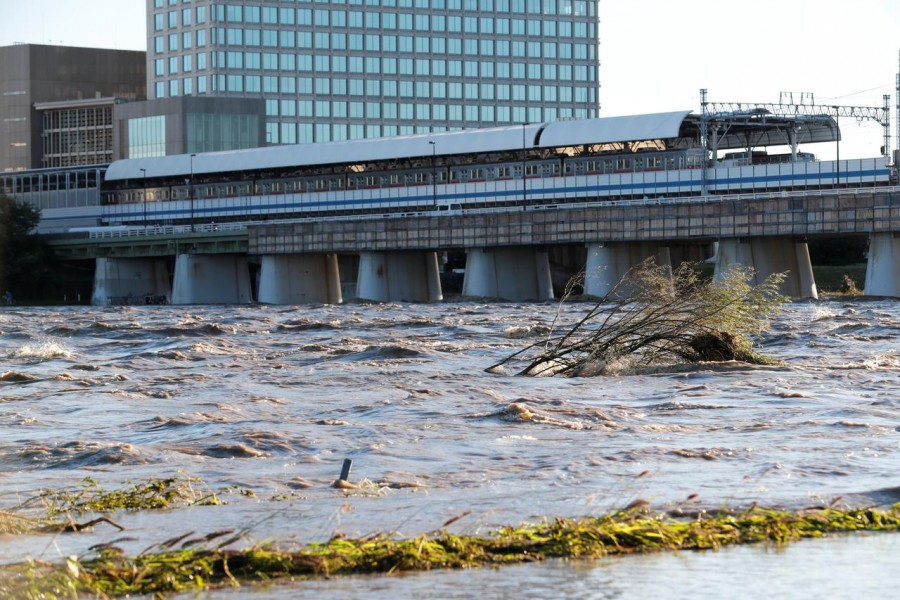Ten people were killed and 16 were missing after the most powerful typhoon to hit Japan in decades paralysed Tokyo, causing rivers to overflow and leaving almost half a million homes without power, public broadcaster NHK reported on Sunday.
Authorities lifted rain and flood warnings for the Kanto region around a becalmed Tokyo as the typhoon plowed up Japan’s northeast coast and authorities raced to assess the damage. Warnings for areas north of the capital began to be lifted by Sunday morning.
Typhoon Hagibis was expected to head out to sea on Sunday evening after churning its way up the northern island of Hokkaido.
Prime Minister Shinzo Abe convened an emergency meeting of relevant ministers and dispatched the minister in charge of disaster management to the worst-hit areas. He offered condolences to the families of those who died and said the government was working to save people’s lives and property.
“The government will do everything in its power to cooperate with relevant agencies to restore services as soon as possible,” said Abe. The government has also set up a taskforce to deal with the damage, NHK reported.
Ten people were killed in areas including the Chiba, Gunma, Kanagawa and Fukushima prefectures surrounding Tokyo, NHK said. Among them was a man in his 60s who was found in a flooded apartment in Kawasaki, it said.
Sixteen people were also missing on Sunday, it said, adding that the full extent of the damage was only beginning to emerge because it was widespread and many areas were still under water.
Some 425,000 homes were without power, the government said, reviving fears of a repeat of the weeks-long power outages suffered after another typhoon hit east of Tokyo last month, Reuters reported.
In Fukushima, north of the capital, Tokyo Electric Power Co reported irregular readings from sensors monitoring water in its Fukushima Daiichi nuclear plant overnight. The plant was crippled by a 2011 earthquake and tsunami.
NHK showed swaths of low-lying residential areas inundated in parts of central and eastern Japan by overflowing rivers, with some of the worst damage caused by Chikuma river in central Japan’s Nagano prefecture.
NHK showed military helicopters airlifting stranded residents from homes near the river, after they got trapped by massive quantities of brown water reaching the roofs of their houses. The first floor of a large care home for the elderly in Nagano city was shown under water.
Tokyo was returning to regular life with stores reopening and trains resuming operations. The buzz of rescue helicopters and wailing of fire engine sirens was the main remainder that emergency services were still working to help the residents.
Authorities issued evacuation advisories and orders for more than 6 million people across Japan as the storm unleashed the heaviest rain and winds in years. Some 126 injuries have been reported so far, NHK said.
RESUMING OPERATIONS
The storm, which the government said could be the strongest to hit Tokyo since 1958, brought record-breaking rainfall in many areas, including the popular resort town of Hakone, which was hit with 939.5 mm (37 inches) of rain over 24 hours.
Hagibis, which means “speed” in the Philippine language Tagalog, made landfall on Japan’s main island of Honshu on Saturday evening. A magnitude 5.7 earthquake shook Tokyo shortly after.
Shinkansen bullet trains from Tokyo would begin on schedule Sunday with the exception of some services to the most affected parts of the country, NHK said, while the Tokyo subway system was also operating.
The Japan Meteorological Agency had issued the highest alert level for 12 prefectures, warning of the potential for once-in-decades rain totals, but lifted them early on Sunday.
Just last month, another strong storm, Typhoon Faxai, destroyed or damaged 30,000 houses in Chiba, east of Tokyo, and caused extensive power outages.
The capital’s main airports, Haneda and Narita, stopped flights from landing and connecting trains were suspended, forcing the cancellation of more than a thousand flights.
Japan has canceled a maritime fleet review planned for Monday, a spokesman for the Maritime Self-Defence Force said.
The Rugby World Cup match between Namibia and Canada in Kamaishi on Sunday was canceled, although the crucial Japan-Scotland match was set to go ahead. Two matches were canceled on Saturday.
Formula One Grand Prix organisers had also canceled all practice and qualifying sessions scheduled for Saturday.


